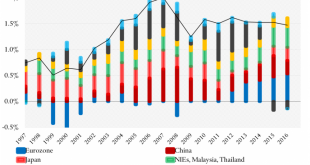The euphoria around international trade and the general consensus regarding capitalism’s inevitable sustenance among countries of the Global South is at least partly due to the absence of an alternative after the collapse of the Soviet Union. The politics of capitalism, with its expansionary dynamics, has assumed a truly “global” avatar by aggressively pursuing a neoliberal globalization agenda. Thus, we see much hype around the numerous trade treaties that governments around the world...
Read More »Dani Rodrik — The great globalisation lie
Third way evangelists presented globalisation as inevitable and advantageous to all. In reality, it is neither, and the liberal order is paying the price.... The fundamental thing to grasp is that globalisation is—and always was—the product of human agency; it can be shaped and reshaped, for good or ill. The great problem with Blair’s forceful affirmation of globalisation back in 2005 was the presumption that it is essentially one thing, immutable to the way that our societies must...
Read More »Cloth for Wine: The Principle of Comparative Advantage 200 years on: Introducing a new free eBook
Two hundred years ago, with a simple yet profound example about England trading cloth for Portuguese wine, David Ricardo introduced the Principle of Comparative Advantage. In this eBook, leading trade policy analysts examine whether Ricardo’s insights remain valid in a world where services as well as good cross borders as does data and technology, where there is a rising China whose growth is heavily dependent on exports, and in the face of a backlash against globalisation.PDF Download...
Read More »IMF Provides Cover for Europe’s Dysfunctional Currency Union
The Council on Foreign Relations’ Brad W. Setser has produced a couple of interesting blogposts on Germany’s fiscal policies of late. The first one, titled “Germany Cannot Quit Fiscal Consolidation,” was published at the end of August. On September 18th, the second one appeared, titled “The Global Cost of the Eurozone’s 2012 Fiscal Coordination Failure.” The latter is more limited in scope and draws heavily on a recent report by the Banque de France. Setser elaborates on the rather...
Read More »The “German Problem” Is Not a Problem for Anyone to Worry About. Or Is It?
It took a very long time. Too long. But just in time for the recent G20 meeting in Hamburg on July 7-8, The Economist’s cover page story featured Germany’s persistent current account surpluses as the world community’ new “German problem”; supposedly an issue of foremost interest to the G20. In fact, Germany has run up current account surpluses exceeding 4 percent of GDP in each and every year since 2004. For the last couple of years Germany’s surpluses even exceeded 8 percent of GDP....
Read More »Unwarranted Gloom and Doom: The IMF on Canada and NAFTA
To read the media today, one would think that NAFTA is a keystone of Canadian prosperity and that renegotiation could lead to a national economic disaster. That view has already been rebutted in a report by Scott Sinclair for the Canadian Centre for Policy Alternatives. He finds that a reversion to WTO tariffs and trade rules would have only a modest impact, albeit that some auto and agricultural exports would suffer. The key take-away is that we can afford to walk away from a bad deal if...
Read More »Why Macron Should Not (and Cannot) Follow the German Model
Jörg Bibow | June 2, 2017 The Economist‘s analysis of Germany’s job market miracle of the past ten years offered in “What the German economic model can teach Emmanuel Macron” is more balanced than the usual accounts one hears in Germany itself. Germans are in love with the idea that structural reform of their labor market and persistent budgetary austerity were solely responsible for the German economy’s superior performance...
Read More »Maybe Working-Class Trump Voters Aren’t Racist, But They Are Comcast
[unable to retrieve full-text content]Maybe Working-Class Trump Voters Aren’t Racist, But They Are Comcast: I swear the analogy makes sense when you read it…
Read More »Fine, We Can Talk About Exports Too, Coffee Edition…
[unable to retrieve full-text content]Fine, We Can Talk About Exports Too, Coffee Edition…: I guess I agree that it’s unfair to talk about imports without talking about exports, and I do find it perplexing that people worry about the effects of imports on employment but don’t match that against the effects of exports on employment.
Read More » Heterodox
Heterodox

